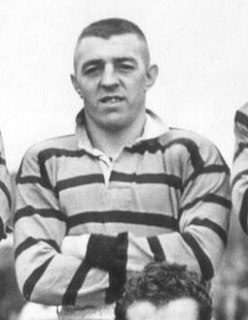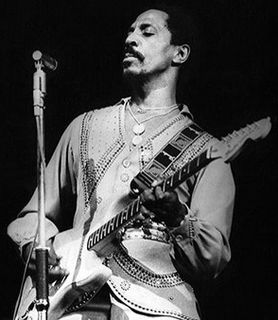Related Research Articles
Leslie "Les" Chamberlain was an English professional rugby league footballer who played in the 1950s and 1960s. He played at club level for Wakefield Trinity, Bramley, Hull Kingston Rovers and Leeds, as a prop, second-row, loose forward, i.e. number 8 or 10, 11 or 12, or, 13, during the era of contested scrums.
Thomas Smales is an English former professional rugby league footballer who played in the 1950s and 1960s, and coached in the 1970s and 1980s. He played at club level for Wigan, Barrow and Featherstone Rovers as a loose forward, and coached at club level for Dewsbury, Featherstone Rovers, Bramley, Doncaster and Batley.
Benjamin John Bowen was a Welsh rugby union, and professional rugby league footballer who played in the 1930s and 1940s. He played club level rugby union (RU) for Llanelli, and representative rugby league for Wales, and at club level for Wigan, and Leigh, , and represented the Welsh league team.
Roy Pollard was an English professional rugby league footballer who played in the 1940s and 1950s. He played at representative level for Great Britain and England, and at club level for Dewsbury and Doncaster, as a wing, i.e. number 2 or 5.
Vivian "Vince" McKeating was an English professional rugby league footballer who played in the 1940s and 1950s. He played at representative level for Great Britain, England, British Empire and Cumberland, and at club level for Dewsbury, Workington Town and Barrow, as a hooker, i.e. number 9, during the era of contested scrums.
George M. John Thorley born in Mountain Ash, was a Welsh rugby union and World Cup winning professional rugby league footballer who played in the 1950s and 1960s. He played representative level rugby union (RU) for Glamorgan, and at club level Neath RFC, and representative level rugby league (RL) for Great Britain, Wales and Other Nationalities, and at club level for Halifax and Dewsbury, as a prop, i.e. number 8 or 10, during the era of contested scrums, he died in Wheatley, Halifax.

Frederick "Eric" E. Batten was an English rugby union and professional rugby league footballer who played in the 1930s, 1940s and 1950s, and coached rugby league in the 1950s. He played club level rugby league (RU) for Sandal RUFC, and representative level rugby league (RL) for Great Britain and England, and at club level for Wakefield Trinity, Hunslet, Featherstone Rovers (captain), Leeds, Castleford and Bradford Northern, as a wing, i.e. number 2 or 5, and coached at club level for Featherstone Rovers, and Batley. Eric Batten appeared in eight Challenge Cup Finals; two for Leeds, five for Bradford Northern, and one for Featherstone Rovers, winning three, and losing five, he scored a total of 443 tries during his career, he his third on the all-time try scorers list behind Brian Bevan, and Billy Boston,
Arthur Keegan, also known by the nickname of "Ollie", was an English professional rugby league footballer who played in the 1950s, 1960s and 1970s, and coached in the 1970s and 1980s. He played at representative level for Great Britain, England and Yorkshire, and at club level for West Town Boys ARLFC, Hull F.C., Bramley and Batley, as a goal-kicking fullback, i.e. number 1, and was captain of Hull during the 1965–66, 1966–67, 1967–68, 1968–69, 1969–70 and 1970–71 seasons, and coached at representative level for Yorkshire, and at club level for Bramley, after serving in the Duke of Wellington's Regiment.
Robert "Bobby" J. Greenough is an English World Cup winning former professional rugby league footballer who played in the 1950s and 1960s. He played at representative level for Great Britain and Lancashire, and at club level for Blackbrook A.R.L.F.C., and Warrington, as a wing, or stand-off, i.e. number 2 or 5, or 6.

Kenneth "Ken"/"Jubby" Jubb was an English professional rugby league footballer who played in the 1930s and 1940s. He played at representative level for Great Britain, England and Yorkshire, and at club level for Castleford and Leeds, as a second-row, i.e. number 11 or 12, during the era of contested scrums. Jubb was a Sergeant Major in the British Army during the Second World War.

James Arthur Bacon was a Welsh rugby union, and professional rugby league footballer who played in the 1910s, 1920s and 1930s, and coached rugby league in the 1920s. He played club level rugby union (RU) for Cross Keys, and representative level rugby league (RL) for Great Britain, Wales and Monmouthshire, and at club level for Leeds (captain), and Castleford, as a wing, or centre, i.e. number 2 or 5, or, 3 or 4, and coached at club level for Castleford.
John Fleming was an English professional rugby league footballer who played in the 1940s and 1950s, and coached in the 1960s. He played at representative level for England, and at club level for Wigan, Batley, Warrington, and Widnes, as a wing, centre, or stand-off, i.e. number 2 or 5, 3 or 4, or 6, and coached at club level for Warrington.

Richard "Dickie"/"Dicky" Evison Lockwood was a rugby union, and professional rugby league footballer who played in the 1880s, 1890s and 1900s. He played representative level rugby union (RU) for England from 1887 to 1894, and was captain in January and February 1894, and Yorkshire, and at club level for Dewsbury and Heckmondwike, as a Three-quarter, and club level rugby league (RL) for Wakefield Trinity, as a Forward, e.g. front row, back row, or lock. Prior to 3 September 1898, Dewsbury was a rugby union club, and prior to the 1896–97 Northern Rugby Football Union season, Heckmondwike was also a rugby union club.
Leonard "Len" Constance was a Welsh rugby union, and professional rugby league footballer who played in the 1940s and 1950s, and coached rugby league in the 1950s. He played representative level rugby union (RU) for Hampshire, and at club level for Newport RFC, Bristol, Portsmouth, Royal Navy and Combined Services, as a fly-half, i.e. number 10, and representative level rugby league (RL) for Wales, and at club level for St. Helens, Dewsbury (captain), Wigan, and Wakefield Trinity, as a centre, or stand-off, i.e. number 3 or 4, or 6, and coached club level rugby league (RL) at Dewsbury.
John Sheridan was an English professional rugby league footballer who played in the 1950s and 1960s, and coached in the 1970s and 1980s. He played at club level for Lock Lane ARLFC, and Castleford (captain), as a centre, or loose forward, i.e. number 3 or 4, or 13., during the era of contested scrums, and coached at club level for Castleford, Leeds and Doncaster.
Thomas "Tommy" Henry Pickup was an English professional rugby league footballer who played in the 1920s and 1930s. He played at representative level for Yorkshire, and at club level for Wakefield Trinity, and the Featherstone Rovers, as a centre, or stand-off, i.e. number 3 or 4, or 6.
Joseph "Joe" T. Anderson, also known by the nickname of 'Ginger', was an English professional rugby league footballer who played in the 1940s, 1950s and 1960s. He played at representative level for Yorkshire, and at club level for Lock Lane ARLFC, Castleford, Leeds and Featherstone Rovers, as a prop, i.e. number 8 or 10, during the era of contested scrums.

Keith Bridges, also known by the nickname of "Bridgie", was an English professional rugby league footballer who played in the 1950s and 1960s. He played at club level for Sharlston Rovers ARLFC, Wakefield Trinity, and Castleford, as a hooker, i.e. number 9, during the era of contested scrums.

Jack "Jackie" Fennell was an English professional rugby league footballer who played in the 1950s and 1960s. He played at representative level for Yorkshire Schoolboys, and at club level for Bagley's Recs and Featherstone Rovers, as a goal-kicking fullback, wing, centre or stand-off, i.e. number 1, 2 or 5, 3 or 4, or 6.

This article contains information about albums and singles released by of American musician and bandleader Ike Turner.
References
- ↑ "Frank Slavin Birth details at freebmd.org.uk". freebmd.org.uk. 31 December 2011. Retrieved 1 January 2012.
- ↑ "TV Pop Diaries - 1958". tvpopdiaries.co.uk. 31 December 2012. Retrieved 1 January 2013.
- ↑ "TV Pop Diaries - 1958". tvpopdiaries.co.uk. 31 December 2012. Retrieved 1 January 2013.
- ↑ "Filmography by TV series for The Kingpins". imdb.com. 31 December 2012. Retrieved 1 January 2013.
- ↑ "Obituary - Tito Burns". telegraph.co.uk. 31 December 2012. Retrieved 1 January 2013.
- ↑ The Dickie Valentine Show - Tuesday, April 28th (1959), Pioneer, Dewsbury ISBN n/a
- ↑ "Introducing… Miss Jackie Lee". jackielee.org. 31 December 2012. Retrieved 1 January 2013.
- ↑ "Jackie Lee Discography - part four". jackielee.org. 31 December 2012. Retrieved 1 January 2013.